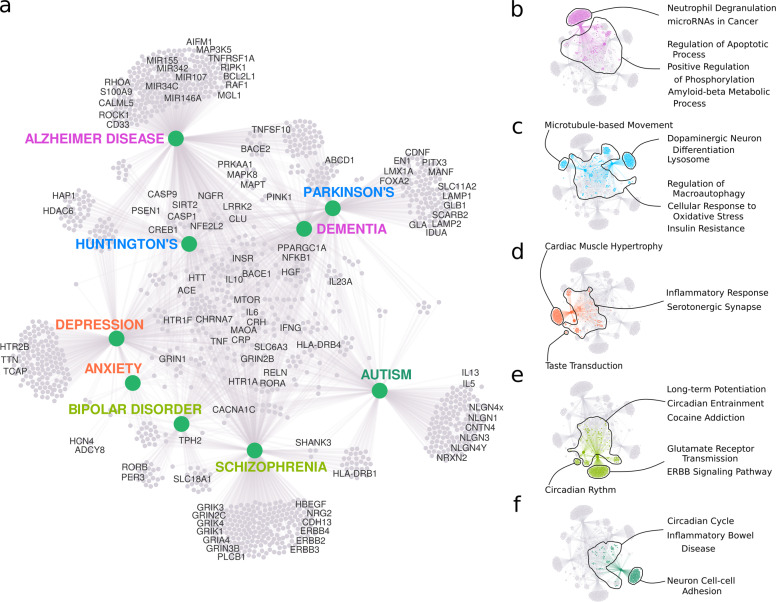Drug repositioning for psychiatric and neurological disorders through a network medicine approach.
Psychiatric and neurological disorders (PNDs) affect millions worldwide and only a few drugs achieve complete therapeutic success in the treatment of these disorders. Due to the high cost of developing novel drugs, drug repositioning represents a promising alternative method of treatment. In this manuscript, we used a network medicine approach to investigate the molecular characteristics of PNDs and identify novel drug candidates for repositioning. Using IBM Watson for Drug Discovery, a powerful machine learning text-mining application, we built knowledge networks containing connections between PNDs and genes or drugs mentioned in the scientific literature published in the past 50 years. This approach revealed several drugs that target key PND-related genes, which have never been used to treat these disorders to date. We validate our framework by detecting drugs that have been undergoing clinical trial for treating some of the PNDs, but have no published results in their support. Our data provides comprehensive insights into the molecular pathology of PNDs and offers promising drug repositioning candidates for follow-up trials.
Authors
Thomaz Lüscher Dias; Viviane Schuch; Patrícia Cristina Baleeiro Beltrão-Braga; Daniel Martins-de-Souza; Helena Paula Brentani; Glória Regina Franco; Helder Imoto Nakaya
External link
Publication Year
Publication Journal
Associeted Project
Network & Precision Medicine
Lista de serviços
-
As antisense RNA gets intronic.As antisense RNA gets intronic.
-
Androgen responsive intronic non-coding RNAs.Androgen responsive intronic non-coding RNAs.
-
Conserved tissue expression signatures of intronic noncoding RNAs transcribed from human and mouse loci.Conserved tissue expression signatures of intronic noncoding RNAs transcribed from human and mouse loci.
-
The intronic long noncoding RNA ANRASSF1 recruits PRC2 to the RASSF1A promoter, reducing the expression of RASSF1A and increasing cell proliferation.The intronic long noncoding RNA ANRASSF1 recruits PRC2 to the RASSF1A promoter, reducing the expression of RASSF1A and increasing cell proliferation.
-
Antisense intronic non-coding RNA levels correlate to the degree of tumor differentiation in prostate cancer.Antisense intronic non-coding RNA levels correlate to the degree of tumor differentiation in prostate cancer.
-
Insight Into the Long Noncoding RNA and mRNA Coexpression Profile in the Human Blood Transcriptome Upon Leishmania infantum Infection.Insight Into the Long Noncoding RNA and mRNA Coexpression Profile in the Human Blood Transcriptome Upon Leishmania infantum Infection.
-
Long non-coding RNAs associated with infection and vaccine-induced immunityLong non-coding RNAs associated with infection and vaccine-induced immunity
-
Comparative transcriptomic analysis of long noncoding RNAs in Leishmania-infected human macrophagesComparative transcriptomic analysis of long noncoding RNAs in Leishmania-infected human macrophages
-
SARS-CoV-2 Selectively Induces the Expression of Unproductive Splicing Isoforms of Interferon, Class I MHC, and Splicing Machinery Genes.SARS-CoV-2 Selectively Induces the Expression of Unproductive Splicing Isoforms of Interferon, Class I MHC, and Splicing Machinery Genes.

